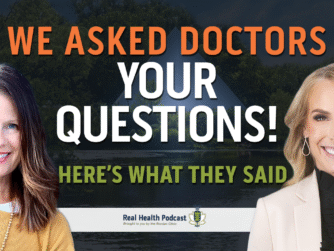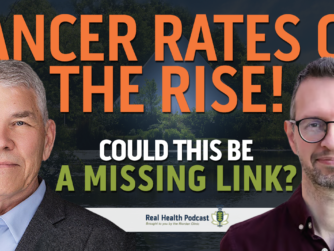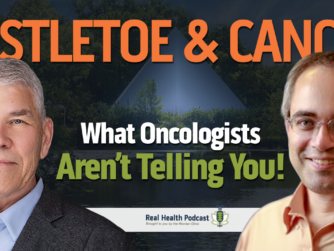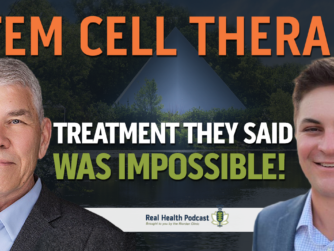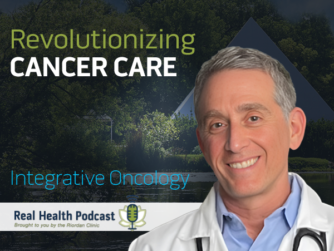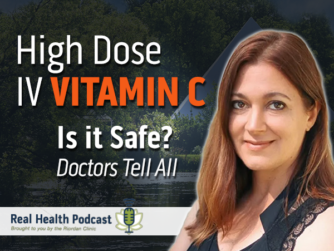This episode is the second in a series introducing the providers at Riordan Clinic.
Dr. Moffitt is a Naturopathic Physician who serves as the Medical Director of the Hays location of the Riordan Clinic. He specializes in regenerative injection techniques, pain management, sports rehabilitation, chronic illness, functional medicine, bioidentical hormone replacement and thyroid replacement.
In this episode, Dr. Moffitt shares his journey into naturopathic medicine and talks about the benefits of regenerative injection therapies.
Thank You to This Episode’s Sponsor
Episode Transcripts
Intro: This is the Real Health podcast brought to you by Riordan Clinic. Our mission is to bring you the latest information and top experts in functional and integrative medicine to help you make informed decisions on your path to real health.
Leah Chischilly: Welcome everybody to the Real Health podcast. I’m your host today Leah Chischilly and I am joined by Dr. Dustin Moffitt. He’s a naturopathic doctor and the clinic director at our Hay’s clinic of the Riordan Clinic. So, welcome Dr. Moffitt. Thanks for joining me today.
Dr. Moffitt : Thanks for having me.
Leah Chischilly: Nice to see you. So we really just want to take an opportunity to get to know you a little bit better and talk about some of the ways that you’re helping patients at Riordan Clinic and just in your daily life. So, first and foremost, I want to know, how did you get into naturopathic medicine in the first place?
Dr. Moffitt: To kind of boil it down, it was because a lot of my family members were dealing with polypharmacy or just not getting the level of care that they needed from the conventional medical society. It doesn’t mean that it was a lack of care. It just wasn’t fully encompassing. So, it got me kind of looking for other options to fulfill what I wanted to give back to my patients.
Leah Chischilly: Nice. And so after pursuing your education, were you able to help those family members? And this is probably a better question. Did they listen to you? Because I know sometimes family can be the biggest challenge.
Dr. Moffitt: The ones that I was mentioning sadly did not make it through the time that I was able to complete my medical training. But those past that, yes, I have been fairly successful in getting them to follow through. Obviously not everybody, and you’re correct. Yeah. Family members can tend to be some of the most struggle.
Leah Chischilly: It’s like, if anyone else says it, they’ll hear it, but if it’s their own family member, let alone like a sibling or a son, it doesn’t seem to resonate as much. That’s okay. We’ll get there eventually, Right?
Dr. Moffitt: Just got to keep trying. Right. Yep.
Leah Chischilly: Exactly. So, I know you specialize in a few different things, but is there something in particular, one aspect of naturopathic medicine that really resonates with you or just really was a passion for you?
Dr. Moffitt: My biggest passion would be the regenerative medicine field. I guess you could say the naturopathic aspect would be helping the body complete more efficient ways of going through wound healing and getting out of chronic pain. So if I had to pick my favorite portion of practice would be helping people resolve their pain.
Leah Chischilly: And what are some of the ways that you do that?
Dr. Moffitt: So, I utilize several different therapies. The top two here in this office would be dextrose prolotherapy and platelet-rich plasma therapy. Both of those we follow up with Prolozone injections as well.
Leah Chischilly: So can you tell me a little bit about, and give me some of the details of those treatments? We’re trying to put it in a sense that anybody can understand, because I know in medicine we kind of have our own language. So what does that mean to the typical patient coming in? What do those treatments look like?
Dr. Moffitt: So both of them are injection therapies, and they work inevitably the same way at the end of the day. They both help to regenerate tissue in a controlled fashion through a controlled injury. Therefore the injection, dextrose prolotherapy utilizes dextrose, which is a sugar solution. I call it a middleman approach. It helps to eventually start an inflammatory cascade by irritating local tissue to then bring in healing components from the body that it naturally already has. So, it promotes the wound healing cascade through that process. Platelet rich plasma is exactly that. What we do is we pull whole blood from the patient and we process that down to get a concentrated platelet pellet, to be able to re administer into the patient. Platelets are most commonly known for clotting factors and in healing. But part of that is because they actually bring local regenerative tissue markers, so things to help rebuild cartilage, they help rebuild nerve tissue and they help rebuild blood flow.
Leah Chischilly: I feel like these are things that are probably really good for bad knees and backs. And what other kinds of areas is it? Mostly joints?
Dr. Moffitt: Mostly joints, but any kind of a tendon or ligament injury. So muscles can be affected with that. Um, nerve based injuries I tend to rely more on the dextrose prolotherapy, because dextrose is far more nutritive to nervous tissue. And we can use what is called nerve hydrodissection. So, it’s a fluid pressure to help create extra channels for those nerves. So it just frees up the nerves that are already kind of locked into place with scar tissue.
Leah Chischilly: Wow. That’s really interesting. I feel like this is something that not a lot of people know about.
Dr. Moffitt: It is not as commonly known as I’d like it to be. It’s been known about for a very long while. Uh, Dr. Hackett and Hemwall are two of the biggest MD’s that started the trend of prolotherapy back in the 1950s. But, it even dates further back into the early nineteen hundreds.
Leah Chischilly: Oh, wow. So it’s definitely got some staying power then, so it must be effective. And I imagine there’s quite a bit of research that backs it up as well.
Dr. Moffitt: There is a lot of research, and it’s pretty easy to find for almost anybody. If you’re curious, just go to Pubmed and type in prolotherapy or platelet rich plasma therapy. And a lot of times they’ll pull up clinical trials, research studies, peer reviewed, double-blind.
Leah Chischilly
And what was it that got you most interested in, in that particular area?
Dr. Moffitt
Learning about it from several different docs that were doing prolotherapy on my clinic rotations while I was in medical school. We learned about it a little bit here and there through some of our coursework, but most of it all has been past medical training. So, I would preceptor or shadow with doctors that were doing it outside of my clinical rotations to learn more. I did several weekend courses. I’ve read multiple of the books that kind of walked through protocols on how to do this. So there’s many levels of training that come into putting this together. But I would say most of what has occurred is it’s kind of a mixture of everybody’s style that I’ve learned from. So, you learn every prolotherapist or injection regenerative specialist will have their own approach, which is why if one person hasn’t worked for you, maybe another person could or vice versa. We all kind of get our own protocols that we follow or our own skillset and just learn through years.
Ad
There’s a lot more to this conversation and it’s coming up right after the break
Today’s episode of the Real Health podcast is brought to you by the Riordan Clinic Nutrient Store. The nutrient store is your resource for the highest quality nutritional supplements. Every supplement in the store is handpicked by the expert medical staff at Riordan clinic, providing you with the best quality purity, consistency and effective dosing available. Visit store.Riordanclinic.org to shop online.
Leah Chischilly
Yeah, that’s awesome. Um, who do you work with typically, is it people who are athletes who seek this type of treatment out, or is it people who are just having pain? What is the most common that you’re seeing there and Hays,
Dr. Moffit
We see anybody and everybody with any kind of injury. So if you’ve got a place that is hurting you, if you notice that you toss and turn a lot while you’re sleeping, if you go to bend over and every time your back pops out and your chiropractor has to put it back into place all the time, if you lifted something too heavy and felt a tendon snap, or you’re a volleyball player and kind of reached out and fell on your ribs. And now you’ve got rib injuries. You’re a football player that turned too much or got tackled. We treat it all here.
Leah Chischilly
Yeah, that’s really good to know. Not knowing that this therapy is so widely available and, um, that it can benefit so many different things. And my intention was not to go down the route and try to understand that. But it’s so interesting that I couldn’t help but do that, but I do want to let know a little bit more about you as well. Dr. Moffitt. How did you end up at Riordan clinic?
Dr. Moffitt
So, it’s been three and a half to four years now ago that I joined with Riordan clinic. I had my practice in, in Oregon and was just always looking for other options and I’ve always loved what Riordan Clinic had to offer. I love that they’re so multifactorial in treating patients of every shape, size, any kind of condition they have, all towards the main goal of getting real health. Pain falls into real health and I wanted to bring my expertise into their realm and it kind of just became history in the making from there.
Leah Chischilly
Yeah, that’s awesome. It’s definitely a valuable piece of the puzzle of helping people get out of pain. And, and on top of that, you do many other things. What other kinds of specialties do you have?
Dr. Moffitt
So, I hold certifications in bio-identical hormone replacement therapy in thyroid replacement therapy and then IV nutrition therapy.
Leah Chischilly
Very good. And those are things that are very much needed at this time. I know a lot of people suffering from hormone imbalances, and going through changes. Thyroid disorders I’ve found are rampant these days. And so it’s nice to know that there are more natural or alternatives available.
Dr. Moffitt
There are plenty of options available, um, and to kind of go on the thyroid aspect. I do see a lot of patients that come in to our clinic mainly because they’re their primary care providers have denied them options to try other thyroid medications. Um, so the most commonly prescribed iron medication is a synthetic T4 medication. There’s nothing wrong with that, that medication. Some people do really well on it, but some people don’t perform optimally at that. Um, so we, we do see a lot of people that seek us out for natural or desiccated thyroid. Um, so I do get quite a few of those, but also a lot of providers don’t know to manipulate all of the components of the thyroid to get a very well balanced thyroid function. Um, and you could say the, actually almost the same kind of verbiage for hormone replacement therapy. Um, just because your hormones are a little off doesn’t mean that you absolutely need hormones, but having hormones and balance are part of real health.
Leah Chischilly
Absolutely. And, and with you saying part of real health, so this is the real health podcast and we really want to make it known and understand like what real health is. So I like to ask everybody who’s on the show, what is your definition of real health and what is one step that any person listening to this podcast can take to help work toward that goal of real health,
Dr. Moffitt
Real health is feeling, acting, living health. So everyone’s, uh, definition of that is going to be different. But if you’re in pain, having minimal to no pain would be part of real health. If you’re an insomniac and not sleeping, sleeping well throughout the night can be real health. If you’re eating a lot of junk food and not getting nutrition through your diet, cleaning up the diet can be a big portion of real health. Um, not having any kind of disease or having a managed disease can be a big part of it. So if you struggle with high blood pressure, having regulated blood pressure without medication would be obviously the best picture of real health, but sometimes just having regulated blood pressure while medicated and living a healthy lifestyle can be a big portion of it.
Leah Chischilly
I really liked that viewpoint. I don’t think I’ve heard someone say it quite like that before.
Dr. Moffitt
Well, and like I said, I didn’t fully encompass everyone, but real health is, is feeling well and healthy. Um, and everybody’s picture of real health is going to be different, which is why we don’t have cookie cutter protocols that fit every single person. So we try to make it as individualized as possible.
Leah Chischilly
That’s wonderful. So what is one thing that you cultivate your own real health? What is one thing that you do?
Dr. Moffitt
Um, I exercise, uh, when I’m having a bad mental health day, I won’t go for a walk and just try not to think about anything other than just being there and appreciating small parts of life. Like today’s a beautiful sunny day outside. Um, I try to make sure that I nourish my body. Do I eat 100% as I should? No, nobody’s perfect. Um, but do I try to make sure that I’m at least getting nutrient density and through my diet? Yes. Do I take some supplements? Sure. Do I take the same ones every single day? No. Um, I, I mix it up and same thing. I don’t do the same thing every day for my health. I always try to figure out what my next step is to, to obtaining real health.
Leah Chischilly
That’s great. Thanks so much Dr. For joining me today. And I know that we’ll be talking quite a bit in the future and we really look forward to learning more from you.
Dr. Moffitt
All right. Thank you for having me. It was pleasure. Yeah. Take care.
Outro
Thank you for listening to the real health podcast. If you enjoy this episode, be sure to subscribe and leave us a review. You can also find all of the episodes and show notes over at realhealthpodcast.org. Also be sure to visit Riordan clinic.org, where you will find hundreds of videos and articles to help you create your own version of real health.


